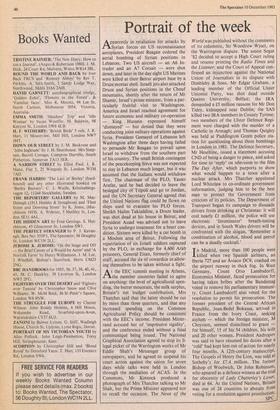Portrait of the week
pparently in retaliation for attacks by I—I-Syrian forces on US reconnaissance aeroplanes, President Reagan ordered the aerial bombing of Syrian positions in Lebanon. Two US aircraft — an A6 In- truder and an A7 Corsair — were shot down, and later in the day eight US Marines were killed at their Beirut airport base by a Druze mortar shell. Israeli jets also attacked Druze and Syrian positions in the Chouf mountains, shortly after the return of Mr Shamir, Israel's prime minister, from a par- ticularly fruitful visit to Washington. America and Israel reached agreement for future economic and military co-operation — King Hussein expressed himself 'dismayed' — but denied that they were conducting joint military operations against Syria. President Gemayel of Lebanon left Washington after three days having failed to persuade Mr Reagan to prevail upon Israel to withdraw from the southern part of his country. The small British contingent of the peacekeeping force was not expected to stay in Lebanon much longer, but it was assumed that the Italians would withdraw first. The chairman of the PLO, Yasser Arafat, said he had decided to leave the besieged city of Tripoli and go to Jordan, and the UN Secretary General agreed that the United Nations flag could be flown on ships used to evacuate his PLO forces. Sheikh Halim Takieddine, a Druze leader, was shot dead at his house in Beirut, and President Assad was advised not to leave Syria to undergo treatment for a heart con- dition. Sixteen were killed by a car bomb in a Moslem area of Beirut. Following the repatriation of six Israeli soldiers captured by the PLO, in exchange for 4,600 Arab prisoners, General Eitan, formerly chief of staff, accused the six of cowardice in allow- ing themselves to be taken without a fight.
A t the EEC summit meeting in Athens, ra.the member countries failed to agree on anything: the level of agricultural spen- ding, the butter mountain, the milk surplus, Britain's net budget contribution. Mrs Thatcher said that the latter should be cut by more than three quarters, and that any increased spending on the Common Agricultural Policy should be consistent with the EEC's income. President Mitter- rand accused her of `impressive rigidity', and the conference ended without a final communique being issued. The National Graphical Association agreed to stop its il- legal picket of the Warrington works of Mr Eddie Shah's Messenger group of newspapers, and he agreed to suspend his court action against the union for seven days while talks were held in London through the mediation of ACAS. In the Commons, Mr Kinnock produced a photograph of Mrs Thatcher talking to Mr Shah, but the Prime Minister appeared not to recall the occasion. The News of the World was published without the comments of its columnist, Sir Woodrow Wyatt, on the Warrington dispute. The union Sogat '82 decided to accept a High Court ruling and resume printing the Radio Times and the Listener; and the Court of Appeal con- firmed an injunction against the National Union of Journalists in its dispute with Dimbleby & Sons. Mr Edgar Graham, a leading member of the Official Ulster Unionist Party, was shot dead outside Queens University, Belfast; the IRA demanded a ES million ransom for Mr Don Tidey, kidnapped near Dublin; the SAS killed two IRA members in County Tyrone; two members of the Ulster Defence Regi- ment were charged with the murder of a Catholic in Armagh; and Thomas Quigley was held at Paddington Green police sta- tion for questioning about three bombings in London in 1981. The Defence Secretary, Mr Heseltine, issued a statement accusing CND of being a danger to peace, and asked for time to 'reply' on television to the film The Day After, which purports to show what would happen to a town after a nuclear attack. Mrs Thatcher appointed Lord Whitelaw to co-ordinate government information, judging him to be the best man to protect the Government from criticism of its policies. The Department of Transport began its campaign to dissuade drivers from drinking at Christmas: it will cost nearly El million, the police will use electronic 'Intoximeter' breath-testing devices, and in South Wales drivers will be confronted with the slogan, `Remember a combination of alcohol, blood and petrol can be a deadly cocktail.'
I n Madrid, more than 100 people were
killed when two Spanish airliners, an Iberia 727 and an Aviaco DC9, crashed on the airport runway in thick fog. In West Germany, Count Otto Lambsdorff, Economics Minister, faced prosecution for having taken bribes after the Bundestag voted to remove his parliamentary immuni- ty. Count Lambsdorff also voted for the resolution to permit his prosecution. The former president of the Central African Republic, Jean-Bedel Bokassa, 'arrived in France from the Ivory Coast, seeking *Wm — which the foreign minister, M Cheysson, seemed disinclined to grant — for himself, 15 of his 54 children, his wife and 20 other women. President Andropov was said to have resumed his duties after a `cold' had kept him out of action for nearly four months. A 12th-century manuscript, The Gospels of Henry the Lion, was sold at Sotheby's for £7.4 million. The former Bishop of Woolwich, Dr John Robinson, who apeared as a defence witness at the trial for obscenity of Lady Chatterley's Lover, died at 64. At the United' Nations, Britain was one of 28 countries to abstain from voting for a resolution against prostitution.














































 Previous page
Previous page